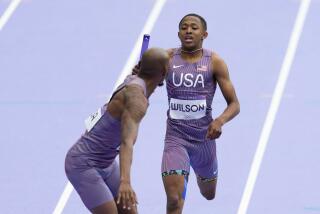He Took a Run at Fame in Barcelona Games
- Share via
You won’t find his likeness on any cereal boxes and he isn’t currently appearing in any athletic shoe commercials on television, yet Quincy Watts was The Man in the 400-meter dash before the reign of Michael Johnson.
Johnson, who became the first man to win the 200 and 400 in the same Olympic Games in Atlanta last summer, has dominated the 400 so thoroughly in recent years that it’s easy to forget that Taft High graduate Watts won the 1992 Olympic title in Barcelona.
Watts’ victory in a then-Olympic record of 43.5 seconds came at such a young age--22--that some track expects thought he had a good chance to become the first man to win two Olympic titles in the event. Instead, his sprint fortunes have waned.
He was ranked fourth in the world in 1993 and had a season best of 44.13. But he failed to break 45 seconds in 1994 and ’95 and finished eighth in last year’s Olympic trials before moving up to seventh after a fellow competitor was disqualified.
Nonetheless, Watts has carved quite a spot for himself in the sports history of the San Fernando Valley.
The Detroit native, who moved to Woodland Hills in 1984 to live with his father, Rufus, because his mother, Allidah Hunt, thought he needed a male role model, is the only graduate of a Valley high school to win an individual Olympic title in track and field. He led Taft to the 1986 state championship as a sophomore by winning the 100, finishing second in the 200 and anchoring the second-place 400 relay team.
He won state titles in the 100 and 200 as a junior in 1987 before finishing second in the 200 in 1988.
Injuries hampered him during his first two years at USC, but he focused on the 400 in 1991, and it paid off with a runner-up finish in the NCAA championships.
He won the 1992 NCAA title and finished third in the Olympic trials before winning the 400 and running a 43.1 leg on a world-record-setting 1,600 relay team in the Olympics.
His most impressive performance might have come in his semifinal race at the Games, however, when he clocked a then-Olympic record of 43.71 after easing up in the last 20 meters of the race.
“I eased off at the end so I was surprised to see the time was so fast,” Watts told Track & Field News magazine. “I’ll take it.”
More to Read
Go beyond the scoreboard
Get the latest on L.A.'s teams in the daily Sports Report newsletter.
You may occasionally receive promotional content from the Los Angeles Times.










